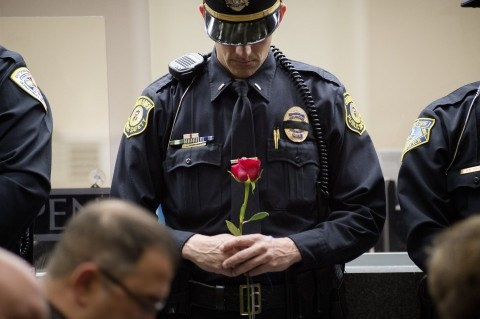This story was produced by a student in the Madison365 Academy, Madison365’s journalism training program.
On Monday, July 11, Representative David Steffen (R-Howard) announced what he called the “Blue Lives Matter” bill, which would classify an attack against a police officer into a hate crime. Many similar proposals have been introduced nation-wide, with Louisiana being the only state that has passed it so far. The bill itself has picked up a lot of controversy as activists question whether the bill is necessary or is made to mock the Black Lives Matter movement.
Wisconsin’s hate crime statute currently protects classes of people based upon “race, religion, color, disability, sexual orientation, national origin or ancestry of that person or the owner or occupant of that property, whether or not the actor’s belief or perception was correct.” Representative Steffen would like to add the state of being a police officer to the list, making it the first profession to be named a protected class.

Steffen did not respond to a request for comment from Madison365. However, in an interview with Wisconsin Public Radio, the 4th District Representative said the bill’s purpose is to “provide district attorneys and judges in the state with the opportunity to [add on] additional fines…additional penalties.” Steffen states that with the bill “an attack against the badge, specifically because they wear the badge, will…add on an additional hate crime punishment which is up to five years (in prison).” A hate crime against a police officer also “does not need to be violent,” he said, allowing for nonviolent misdemeanors to be eligible for the additive punishment.
Steffen’s bill comes in response to the killing of five officers in Dallas. Deterring crime against the police “is ultimately the hope,” Steffens said, though he was unable to provide any evidence that it would have that effect.
However, not everyone sees the same purpose for the bill. Young Gifted and Black Coalition cofounder and Madison365 columnist Matthew Braunginn thinks there’s more to it: “Like a lot of laws, it helps them open up and target black a brown people,” he tells Madison365. “It’s hidden white supremacy and hidden racism built into our legal system which is absolutely nothing new. This goes all the way back to slave codes, to black codes, to the civil war, to drug laws, and this now. We have a history of building laws that disproportionately target black and brown people.”

Braunginn doesn’t believe this bill will reduce attacks against police. “No, not at all,” Braunginn said, “Police themselves don’t even deter crime, they’re first responders. We over-invest in police and we over-invest in incarceration at the demise of things that actually reduce crime, such as ending poverty measures [and] education.”
Tutankhamun “Coach” Assad, founder of the Mellowhood Foundation, similarly believes there will be no deterrent effect if the bill passes. “Of course not,” he said. “The passing of acts that have reported to protect African Americans have not worked. There’s no urgency or overwhelming need to rectify the systemic and legislative challenges that allow [African-Americans] to be continued to be targeted.”
However, Assad did share the same hope as Steffen for the bill. “I’m hopeful that it keeps police from being targeted,” he said. “But, I hope police understand what [African-Americans] go through everyday.”
Coach Assad also has a “great deal of respect for most of the police officers in Madison” and has worked on coalitions in previous years. “I think the police do, most of the time, a great job,” he said. “Are there bad apples? Yes, what makes it horrible is these are bad apples with a gun.”
“Police tend to shift narratives,” Braunginn said, referring to the violent arrest of 18-year-old Genele Laird at East Towne Mall in June as an example. “The police officers were hurt, and charged [Genele] with hurting police officers when she was getting beat, which means this takes it the next step further where she’d be charged with a hate crime…she shouldn’t be charged anyway for being beat by a police officer.”
Both Braunginn and Assad see a potential for a negative impact to arise if this bill were to pass. “(Police) can initiate a confrontation, escalate a confrontation and say that they were under attack.” Braunginn said. “To classify somebody’s profession, and saying somebody targeted their profession, is absolutely preposterous. There’s been no safer time to be police. Data has shown that police attacks have fallen under Obama’s presidency, tremendously, so this is utterly ridiculous.”
“Of course it will (have an impact),” Assad said. “It depends on what the legislation allows,” further stating, “This bill has the potential to be great or horrible depending on what municipal power you want to be utilized and what fashion.” In order to avoid bias, Assad suggests, “It has to be very carefully constructed and acted out.”
Steffen, however, said, “It would not change the daily operation (of the police).”
“Of course” the Blue Lives Matter bill is little more than an attack on the Black Lives Matter movement, Braunginn says, advocating for top to bottom change in the government. “We have to take back the state’s legislature [and] get rid off the governor because they are actively detrimental to many communities throughout the state of Wisconsin,” he said. “Replace them with people that don’t actively act out oppression.”
Steffen said he plans to introduce the bill formally in January. On whether the bill has a chance of passing, Braunginn said, “Oh, absolutely. This legislature is a heavily to the right establishment and has shown a heavy disregard for black, brown, and any really kind of oppressed people.”
Neither the Madison Police Department nor Steffen responded to requests for comment.





























